名词性从句的翻译
名词性从句翻译
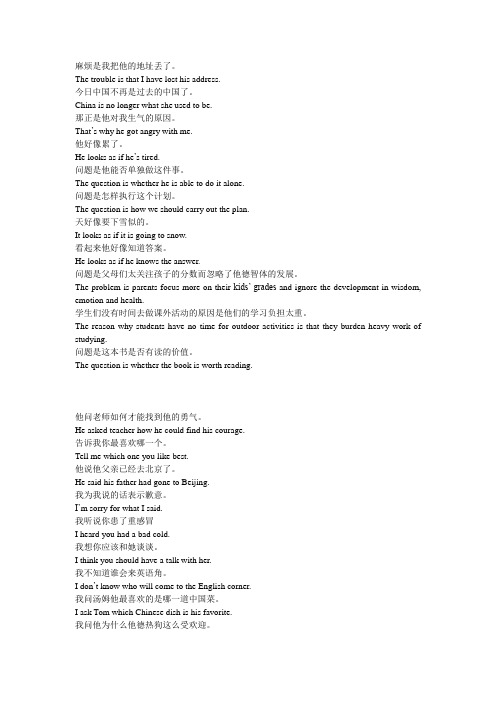
麻烦是我把他的地址丢了。
The trouble is that I have lost his address.今日中国不再是过去的中国了。
China is no longer what she used to be.那正是他对我生气的原因。
That’s why he got angry with me.他好像累了。
He looks as if he’s tired.问题是他能否单独做这件事。
The question is whether he is able to do it alone.问题是怎样执行这个计划。
The question is how we should carry out the plan.天好像要下雪似的。
It looks as if it is going to snow.看起来他好像知道答案。
He looks as if he knows the answer.问题是父母们太关注孩子的分数而忽略了他德智体的发展。
The problem is parents focus more on their kids’ grades and ignore the development in wisdom, emotion and health.学生们没有时间去做课外活动的原因是他们的学习负担太重。
The reason why students have no time for outdoor activities is that they burden heavy work of studying.问题是这本书是否有读的价值。
The question is whether the book is worth reading.他问老师如何才能找到他的勇气。
He asked teacher how he could find his courage.告诉我你最喜欢哪一个。
Tell me which one you like best.他说他父亲已经去北京了。
名词性从句汉译英
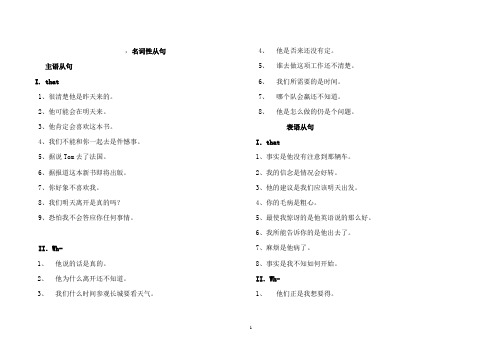
,名词性从句主语从句I. that1、很清楚他是昨天来的。
2、他可能会在明天来。
3、他肯定会喜欢这本书。
4、我们不能和你一起去是件憾事。
5、据说Tom去了法国。
6、据报道这本新书即将出版。
7、你好象不喜欢我。
8、我们明天离开是真的吗?9、恐怕我不会答应你任何事情。
II.Wh-1、他说的话是真的。
2、他为什么离开还不知道。
3、我们什么时间参观长城要看天气。
4、他是否来还没有定。
5、谁去做这项工作还不清楚。
6、我们所需要的是时间。
7、哪个队会赢还不知道。
8、他是怎么做的仍是个问题。
表语从句I.that1、事实是他没有注意到那辆车。
2、我的信念是情况会好转。
3、他的建议是我们应该明天出发。
4、你的毛病是粗心。
5、最使我惊讶的是他英语说的那么好。
6、我所能告诉你的是他出去了。
7、麻烦是他病了。
8、事实是我不知如何开始。
II.Wh-1、他们正是我想要得。
2、问题是它是否值得一做。
3、问提是我们该作些什么来帮助他。
4、问题是谁留下。
5、那就是他出生的地方。
6、我们就是这样分手的。
7、我是你正在找的那个人。
8、这就是我去那的原因同位语从句I.that1、我听到了我们队获胜的消息。
2、他在会上什么都没说的事实使我们惊讶。
3、他打算来的消息使我们高兴。
4、他已经下定学好英语的决心。
5、他当选的消息不是真的。
II.Wh-1、我不知道他什么时候来。
2、你不知道我多么着急。
3、很难回答你提出的我是如何做的问题。
4、我提出的如何邀请他的问题已经得到了解决。
5、你为什么对音乐感兴趣的问题还没回答。
宾语从句I. That clause1,我认为他们学习很努力。
2,他说他将在11日动身。
3,他告诉我医生马上就来。
4,他说他妈妈在读书。
5,他说他的爸爸生于1948年。
6,我恐怕犯了一个错误。
7,我们有把握成功。
8,对不起我错拿了你的钢笔。
II.Whether/ if1,我想知道他明天是否来。
2,我想知道你是否愿意和我一起去看足球赛。
英语八大从句类型例句
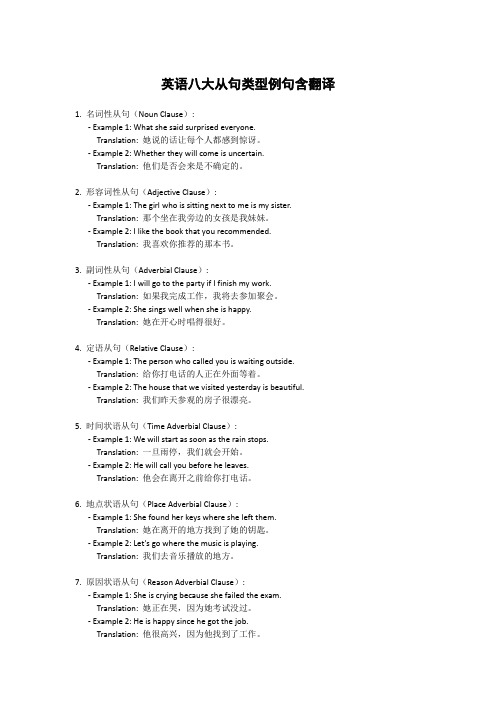
英语八大从句类型例句含翻译1. 名词性从句(Noun Clause):- Example 1: What she said surprised everyone.Translation: 她说的话让每个人都感到惊讶。
- Example 2: Whether they will come is uncertain.Translation: 他们是否会来是不确定的。
2. 形容词性从句(Adjective Clause):- Example 1: The girl who is sitting next to me is my sister.Translation: 那个坐在我旁边的女孩是我妹妹。
- Example 2: I like the book that you recommended.Translation: 我喜欢你推荐的那本书。
3. 副词性从句(Adverbial Clause):- Example 1: I will go to the party if I finish my work.Translation: 如果我完成工作,我将去参加聚会。
- Example 2: She sings well when she is happy.Translation: 她在开心时唱得很好。
4. 定语从句(Relative Clause):- Example 1: The person who called you is waiting outside.Translation: 给你打电话的人正在外面等着。
- Example 2: The house that we visited yesterday is beautiful.Translation: 我们昨天参观的房子很漂亮。
5. 时间状语从句(Time Adverbial Clause):- Example 1: We will start as soon as the rain stops.Translation: 一旦雨停,我们就会开始。
英语从句的翻译
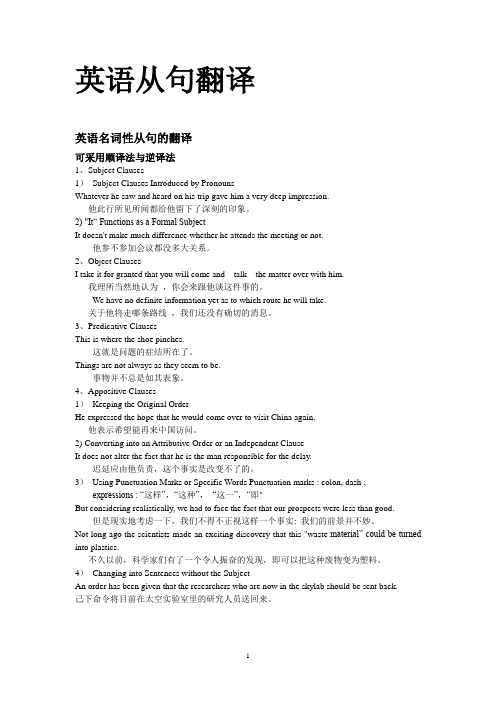
英语从句翻译英语名词性从句的翻译可采用顺译法与逆译法1、Subject Clauses1)Subject Clauses Introduced by PronounsWhatever he saw and heard on his trip gave him a very deep impression.他此行所见所闻都给他留下了深刻的印象。
2) "It“ Functions as a Formal SubjectIt doesn't make much difference whether he attends the meeting or not.他参不参加会议都没多大关系。
2、Object ClausesI take it for granted that you will come and talk the matter over with him.我理所当然地认为,你会来跟他谈这件事的。
We have no definite information yet as to which route he will take.关于他将走哪条路线,我们还没有确切的消息。
3、Predicative ClausesThis is where the shoe pinches.这就是问题的症结所在了。
Things are not always as they seem to be.事物并不总是如其表象。
4、Appositive Clauses1)Keeping the Original OrderHe expressed the hope that he would come over to visit China again.他表示希望能再来中国访问。
2) Converting into an Attributive Order or an Independent ClauseIt does not alter the fact that he is the man responsible for the delay.迟延应由他负责,这个事实是改变不了的。
名词性从句翻译
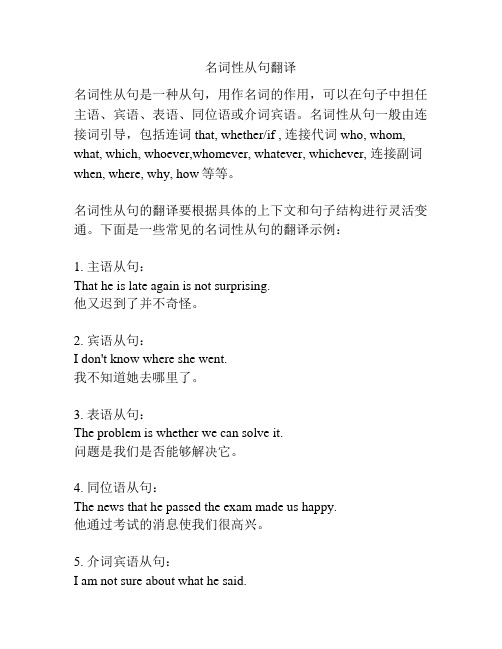
名词性从句翻译名词性从句是一种从句,用作名词的作用,可以在句子中担任主语、宾语、表语、同位语或介词宾语。
名词性从句一般由连接词引导,包括连词that, whether/if , 连接代词who, whom, what, which, whoever,whomever, whatever, whichever, 连接副词when, where, why, how等等。
名词性从句的翻译要根据具体的上下文和句子结构进行灵活变通。
下面是一些常见的名词性从句的翻译示例:1. 主语从句:That he is late again is not surprising.他又迟到了并不奇怪。
2. 宾语从句:I don't know where she went.我不知道她去哪里了。
3. 表语从句:The problem is whether we can solve it.问题是我们是否能够解决它。
4. 同位语从句:The news that he passed the exam made us happy.他通过考试的消息使我们很高兴。
5. 介词宾语从句:I am not sure about what he said.我不确定他说的是什么。
6. 间接引导名词性从句:He asked where I lived.他问我住在哪里。
7. 是否从句:I wonder whether/if she will come to the party.我想知道她是否会来参加派对。
8. 选择性从句:He asked me whether I preferred coffee or tea.他问我是喜欢咖啡还是茶。
9. 宾语从句(陈述句变为疑问句):Do you know what time it is?你知道现在几点钟吗?10. 宾语从句(连接代词):I wonder who is going to pick us up at the airport.我想知道谁会在机场接我们。
课件10 名词性从句的翻译

3) 加入冒号、破折号和 “这样”、“这一”、“即”等字眼
But
considering realistically, we had to face the fact that our prospects were less than good. 但在实事求是地考虑一番之后,我们不得不正 视这样一个事实:我们的前景并不妙。 Influenced by these ethics, the new generation live under the delusion that money does not stink. 受这种道德观念的影响,青年一代生活在这样 一种错觉中,以为金钱总是香喷喷的。
Most
remarkable of all is the fact that each question was decidedly consensus, thus enhancing prospects that the treaty will win approval when it comes up for ratification.
7
宾语从句
以that,
what, how引导的 宾语从句 句
以it作形式宾语的宾语从
1) 以that, what, how引导的宾语从句
一般按原句顺序翻译
I
told him that I had to turn him down. 我告诉他我不得不拒绝他。 Did you hear what I said? 你没听见我的话吗? I told him how appealing I found the offer. 我告诉他,这个机会对我有着多么大的吸引 力。
2) 译为类似定语的结构或独立句
名词性从句的翻译

1.他所再三强调的就是, 不管多么困难, 他们决不应该后退寸步. 2.就这样, 小国战胜了大国.
四. 同位语从句
1. An obedient son, I had accepted my father’s decision that I was to be a teacher, though the prospect interested me not at all. 2. Her son, my employer’s nephew, was himself an assistant in the shop. 3.From the very beginning, the fact that I was alive was ignored.
3.他参不参加会议都没有多大关系. (由who, what , which, whoever等引导 的主语从句通常在译文中做主语.) 4.很明显,某些高级人物在玩弄权术, 而我却成了他们的工具. 5.真奇怪,他竟然没有看出自己的缺 点.
“It +形容词+that从句”结构中,将形 容词译成汉语的副词短语,会使译文 更加符合汉语的表达习惯;这与“ it is + 名词+that从句”结构的译法相类 似. 例:It is a pity that you missed such a fine talk. It’s not your fault that this has happened.
因此,我不得不有所取舍。不过我 希望我已经描述了那些影响过我, 并仍在塑造我的世界,丰富我的人 生的事件和人物。
名词性从句的翻译
一. 主语从句
1. Whatever he saw and heard on his trip gave him a very deep impression. 2. It is important that the hotel receptionist make sure that guests are registered correctly.
什么是名词性从句
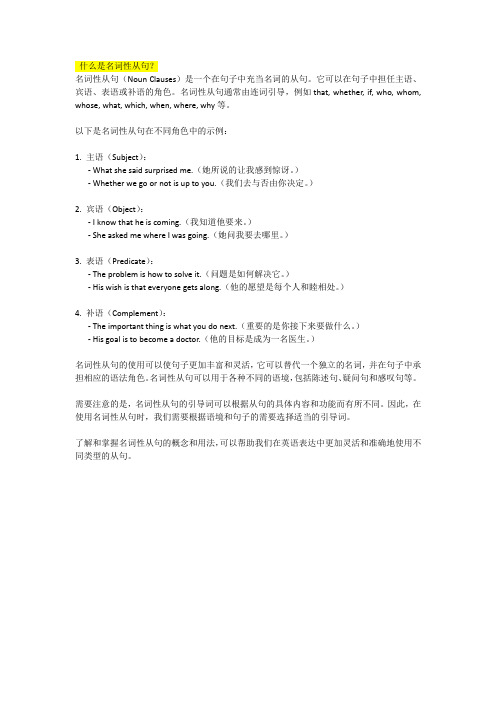
什么是名词性从句?名词性从句(Noun Clauses)是一个在句子中充当名词的从句。
它可以在句子中担任主语、宾语、表语或补语的角色。
名词性从句通常由连词引导,例如that, whether, if, who, whom, whose, what, which, when, where, why等。
以下是名词性从句在不同角色中的示例:1. 主语(Subject):- What she said surprised me.(她所说的让我感到惊讶。
)- Whether we go or not is up to you.(我们去与否由你决定。
)2. 宾语(Object):- I know that he is coming.(我知道他要来。
)- She asked me where I was going.(她问我要去哪里。
)3. 表语(Predicate):- The problem is how to solve it.(问题是如何解决它。
)- His wish is that everyone gets along.(他的愿望是每个人和睦相处。
)4. 补语(Complement):- The important thing is what you do next.(重要的是你接下来要做什么。
)- His goal is to become a doctor.(他的目标是成为一名医生。
)名词性从句的使用可以使句子更加丰富和灵活,它可以替代一个独立的名词,并在句子中承担相应的语法角色。
名词性从句可以用于各种不同的语境,包括陈述句、疑问句和感叹句等。
需要注意的是,名词性从句的引导词可以根据从句的具体内容和功能而有所不同。
因此,在使用名词性从句时,我们需要根据语境和句子的需要选择适当的引导词。
了解和掌握名词性从句的概念和用法,可以帮助我们在英语表达中更加灵活和准确地使用不同类型的从句。
翻译技巧 8 名词性从句的翻译
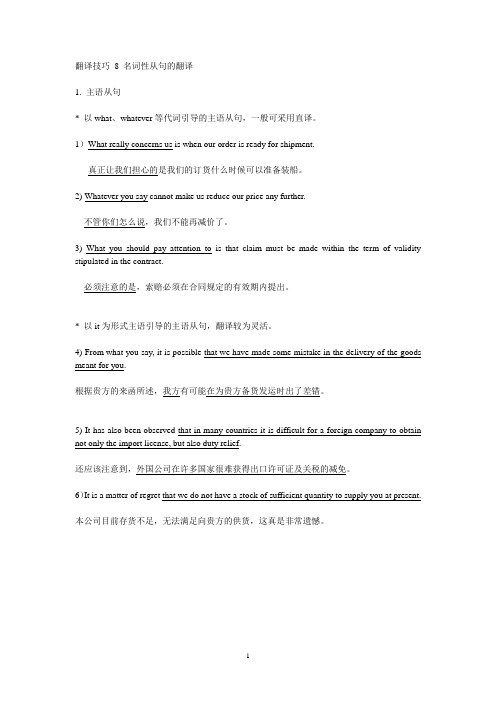
翻译技巧8 名词性从句的翻译1. 主语从句* 以what、whatever等代词引导的主语从句,一般可采用直译。
1)What really concerns us is when our order is ready for shipment.真正让我们担心的是我们的订货什么时候可以准备装船。
2) Whatever you say cannot make us reduce our price any further.不管你们怎么说,我们不能再减价了。
3) What you should pay attention to is that claim must be made within the term of validity stipulated in the contract.必须注意的是,索赔必须在合同规定的有效期内提出。
* 以it为形式主语引导的主语从句,翻译较为灵活。
4) From what you say, it is possible that we have made some mistake in the delivery of the goods meant for you.根据贵方的来函所述,我方有可能在为贵方备货发运时出了差错。
5) It has also been observed that in many countries it is difficult for a foreign company to obtain not only the import license, but also duty relief.还应该注意到,外国公司在许多国家很难获得出口许可证及关税的减免。
6)It is a matter of regret that we do not have a stock of sufficient quantity to supply you at present.本公司目前存货不足,无法满足向贵方的供货,这真是非常遗憾。
翻译4.5:名词性从句的翻译
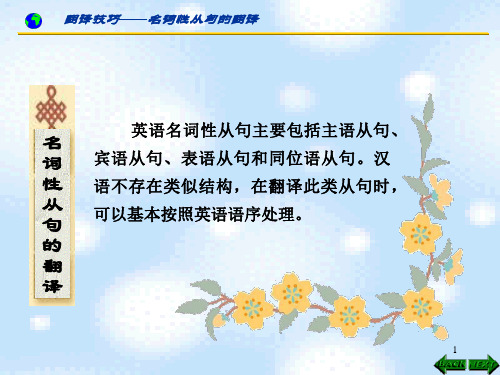
4) It is a matter of common experience that bodies
are lighter in water than they are in air.
物体在水中比在空气中轻,这是一种常识。
6
翻译技巧——1. 主语从句的翻译
discussions.
教授们和女生都发现,男孩子正在逐渐“接管”课堂讨论。
9
翻译技巧——1. 主语从句的翻译
3) It is imagined by many that the operations of the common mind can by no means be compared with these processes.
许多人认为普通人的思维活动根本无法与这些过程相比。
4) It was thought that this drug was blown into the bedroom through a tube in the form of a fine powder which the sleeper breathed in.
青少年现在购物更多了,这就会使他们在光顾的商店里花钱多。
2) That aspect has to be weighed against the fact that they might not help your career plans.
但这些工作可能无助于你的择业规划,你必须在这两个方面权 衡一下。
这些组织指控海军的计划违背了保护动物不受虐待的
联邦法律。
11
翻译技巧——2. 宾语从句的翻译
2) But critics wonder if dolphins can be trusted to
名词性从句的译法

例4:Whatever he saw and heard on his trip gave him a very deep impression. 【译文】他此行所见所闻都给他留下了深刻的印象。 例5:Since hearing her predicament, I’ve always arranged to meet people where they or I can be reached in case of delay. 【译文】听她说了那次尴尬的经历之后,每每与人约 见,我总要安排在彼此能够互相联系的上的地 方,以免误约。
and talk the matter over with him.(it作形式宾
语)
【译文】我理所当然地认为,你会来跟他谈这件事
的。
例3:Another cause of obscurity is that the writer is himself not quite sure of his meaning. (表语从句) 【译文】写不清楚还有一个原因,那就是作者自 己对于所要表达的意思也不是很有把握。
补充例句:名词性从句 例6.We can explain very simply the important differences between solids, liquids, and gases on the basis of the theory that matter is made up of particles, and that these particles can move more easily in some states of matter than in others. (同位语
这些从句的翻译一般按原句的语序处理这些从句的翻译一般按原句的语序处理即可相对比较容易但有时也可以译即可相对比较容易但有时也可以译为并列分句定语从句或其它形式的句为并列分句定语从句或其它形式的句如果名词性从句包含两层以上的意思需要把主句与从句分开译
4种名词性从句的翻译方法

• In July 1898, Curie and her husband got a great success that they discovered the radioactive element—polonium.
• 你来不来我不在乎。
• It seemed incredible that she should have lied to us. • 她居然对我们说谎,这真是不可思议。
• It is strange that she should have failed to see her own shortcomings.
works.【主谓结构作定语】
这是关于这台新型电气仪表如何运作的说明。
2024/8/8
12
同位语从句
常用连词that或链接副词来 引导,用以对某个名词作进 一步的解释或说明。翻译时 也可采取不同的方法。
2024/8/8
13
• 方法一:把同位语从句译成汉语联合复句中的一个分句。
• It was from these slender indications of scholarship that Dr. Weldon drew the conclusion that I was worthy to pass into Harrow.
绕着人工湖跑步的一个好处,就是不能抄近路回家。
The fact is that electronic computer are of great benefit to the development of science and technology.【主谓结构】 事实是电子计算机十分有利于科学技术的发展。
名词性从句的翻译
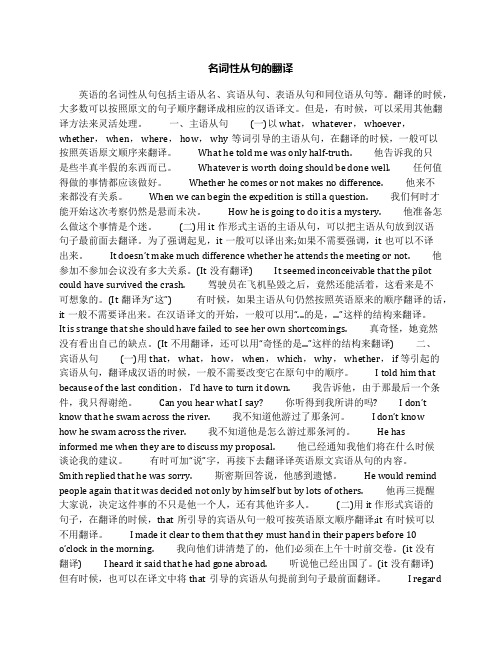
名词性从句的翻译英语的名词性从句包括主语从名、宾语从句、表语从句和同位语从句等。
翻译的时候,大多数可以按照原文的句子顺序翻译成相应的汉语译文。
但是,有时候,可以采用其他翻译方法来灵活处理。
一、主语从句(一)以what, whatever, whoever,whether, when, where, how, why等词引导的主语从句,在翻译的时候,一般可以按照英语原文顺序来翻译。
What he told me was only half-truth. 他告诉我的只是些半真半假的东西而已。
Whatever is worth doing should be done well. 任何值得做的事情都应该做好。
Whether he comes or not makes no difference. 他来不来都没有关系。
When we can begin the expedition is still a question. 我们何时才能开始这次考察仍然是悬而未决。
How he is going to do it is a mystery. 他准备怎么做这个事情是个迷。
(二)用it作形式主语的主语从句,可以把主语从句放到汉语句子最前面去翻译。
为了强调起见,it一般可以译出来;如果不需要强调,it也可以不译出来。
It doesn’t make much difference whether he attends the meeting or not. 他参加不参加会议没有多大关系。
(It没有翻译) It seemed inconceivable that the pilot could have survived the crash. 驾驶员在飞机坠毁之后,竟然还能活着,这看来是不可想象的。
(It翻译为“这”) 有时候,如果主语从句仍然按照英语原来的顺序翻译的话,it一般不需要译出来。
在汉语译文的开始,一般可以用“...的是,...”这样的结构来翻译。
翻译4.5:名词性从句的翻译

3) Your abilities count, but the belief that you can succeed affects whether or not you will.
你的能力固然很重要,但是相信自己会成功的信念将影响你能 否获得成功。
18
翻译技巧——4. 同位语从句的翻译
增加“即”或“那就是”,或用冒号、破折号分 开。 1) This reinforced the idea that anyld do anything I wanted.
青少年现在购物更多了,这就会使他们在光顾的商店里花钱多。
2) That aspect has to be weighed against the fact that they might not help your career plans.
但这些工作可能无助于你的择业规划,你必须在这两个方面权 衡一下。
discussions.
教授们和女生都发现,男孩子正在逐渐“接管”课堂讨论。
9
翻译技巧——1. 主语从句的翻译
3) It is imagined by many that the operations of the common mind can by no means be compared with these processes.
这进一步增强了我的想法:世上无难事,只要我想要做的事, 我都能够做到。
are lighter in water than they are in air.
物体在水中比在空气中轻,这是一种常识。
6
翻译技巧——1. 主语从句的翻译
也可以变换顺序,翻译时主语从句置于句后: 1) It is obvious that such uncomfortable feelings must affect people adversely.
英语名词性从句的翻译

英语名词性从句的翻译英语名词性从句包括主语从句, 宾语从句, 表语从句和同位语从句, 在翻译这类从句时, 大多数可以按照原文的句序翻译成相应的汉语, 但是也有一些具体的处理方法, 下面我们结合一些实例加以说明:例1.How and when human language developed and whether animals such as chimpanzees and gorillas can develop a more elaborate system of communication are issues at present being researched, but as yet little understood.人类的语言是如何发展起来的, 是什么时候形成的, 诸如黑猩猩和大猩猩一类的动物是否会形成一种更加复杂的交流系统, 都是现阶段人们研究的课题, 但对此人们都知之甚少。
(主语从句)例2.How well the prediction will be validated by later performance depends upon the amount, reliability, and appropriateness of the information used and on the skill and wisdom with which it is interpreted. (95年考题)这些预测能在多大程度上被后来的成绩所证实取决于所使用的信息的量、可靠性和适合程度, 并取决于对信息作出解释的技能和智慧。
(主语从句)例3.It is often said that wide reading is the best alternative course of action but even here it is necessary to make some kinds of selection.人们常说, 大量阅读是可供选择的最佳方案, 但即使在这一方面, 也需要某些选择。
- 1、下载文档前请自行甄别文档内容的完整性,平台不提供额外的编辑、内容补充、找答案等附加服务。
- 2、"仅部分预览"的文档,不可在线预览部分如存在完整性等问题,可反馈申请退款(可完整预览的文档不适用该条件!)。
- 3、如文档侵犯您的权益,请联系客服反馈,我们会尽快为您处理(人工客服工作时间:9:00-18:30)。
名词性从句一、主语从句(一)以what, whatever, whoever, whether, when, where, how, why等词引导的主语从句,在翻译的时候,一般可以按照英语原文顺序来翻译。
What he told me was only half-truth.他告诉我的只是些半真半假的东西而已。
Whether he comes or not makes no difference.When we can begin the expedition is still a question.(二)用it作形式主语的主语从句,可以把主语从句放到汉语句子最前面去翻译。
为了强调起见,it一般可以译出来;如果不需要强调,it也可以不译出来。
It doesn’t make much difference whether he attends the meeting or not.他参加不参加会议没有多大关系。
(It没有翻译)It seemed inconceivable that the pilot could have survived the crash.驾驶员在飞机坠毁之后,竟然还能活着,这看来是不可想象的。
(It翻译为“这”)有时候,如果主语从句仍然按照英语原来的顺序翻译的话,it一般不需要译出来。
在汉语译文的开始,一般可以用“...的是,...”这样的结构来翻译。
It is strange that she should have failed to see her own shortcomings.真奇怪,她竟然没有看出自己的缺点。
(It不用翻译,还可以用“奇怪的是...”这样的结构来翻译)二、宾语从句(一)用that, what, how, when, which, why, whether, if 等引起的宾语从句,翻译成汉语的时候,一般不需要改变它在原句中的顺序。
I told him that because of the last condition, I’d have to turn it down.我告诉他,由于那最后一个条件,我只得谢绝。
He has informed me when they ar e to discuss my proposal.有时可加“说”字,再接下去翻译译英语原文宾语从句的内容。
Smith replied that he was sorry.斯密斯回答说,他感到遗憾。
He would remind people again that it was decided not only by himself but by lots of others.(二)用it 作形式宾语的句子,在翻译的时候,that所引导的宾语从句一般可按英语原文顺序翻译;it有时候可以不用翻译。
I made it clear to them that they must hand in their papers before 10 o’clock in the morning.我向他们讲清楚了的,他们必须在上午十时前交卷。
(it没有翻译)I heard it said that he had gone abroad.但有时候,也可以在译文中将that引导的宾语从句提前到句子最前面翻译。
I regard it as an honor that I am chosen to attend the meeting.我被选参加会议,感到光荣。
(it没有翻译)We consider it absolutely necessary that we should open our door to the outside world.(it翻译为“这”)三、表语从句It seems that it is going to snow.看起来要下雪了。
The question remains whether we can win the majority of the people.His view of the press was that the reporters were either for him or against him.四、同位语从句能接同位语从句的名词主要有:belief(相信),fact(事实),hope(希望), idea(想法,观点),doubt(怀疑),news(新闻,消息),rumor(传闻),conclusion(结论),evidence(证据),suggestion(建议),problem(问题),order(命令),answer(回答),decision(决定),discovery(发现),explanation(解释),information(消息),knowledge(知识),law(法律),opinion(意见,观点),truth(真理,事实),promise(承诺),report(报告),thought(思想),statement(声明),rule(规定),possibility(可能)等。
(一)一般来说,同位语从句可以直接翻译在主句后面。
He expressed the hope that he would come over to visit China again.他表示希望再到中国来访问。
There is a possibility that he is a spy.(二)有时候在翻译同位语从句时,可以将其放在所修饰的名词前面,相当于前置的修饰语,但不一定使用定语的标志词“的”。
这种情况下,同位语从句都是比较简单。
We know the fact that bodies possess weight.我们都知道物体具有重量这一事实。
The rumor that he was arrested was unfounded.(三)增加“即”(或者“以为”)这样的词来连接,或用冒号、破折号直接分开主句和同位语从句。
But this does not in any way alter the fact that they are now, from a practical point of view, irrational.但这却丝毫改变不了这样一个事实,即从实用的观点来看,他们今天仍是不合理的。
We have reached the conclusion that practice is the criterion for testing truth. Not long ago, the scientists made an exciting discovery that this wastematerial could be turned into plastics.不久前,科学家们获得一个令人振奋的发现——可以把这种废物变成塑料。
状语从句的翻译一、时间状语从句在英语中,时间状语从句的连接词常常有:when(当...的时候),whenever(每当...),as(当...时), since(自从...),until(直到...,如果不....),till(直到...),before(在...前),after(在...后),as soon as(一...就),once(一旦...),the moment(一...就),immediately(一...就),the day(在...那天),no sooner... than (一...就),hardly(scarcely)... when(一...就),the instant(一...就),instantly(一...就),directly(一...就),the minute(一...就),the second(一...就),every time(每当...),by the time(等到....的时候)等。
(一)译成相应的时间状语While she spoke, the tears were running down.她说话时,泪水直流。
As he finished the speech, the audience burst into applause.他结束讲话的时候,听众掌声雷动。
(二)译成“一(刚、每)...就”的结构I’ll let you know as soon as I have it arranged.我一安排好就通知你。
Directly he uttered these words there was a dead silence.(三)译成条件句Turn off the switch when anything goes wrong with the machine.如果机器发生故障,就把电门关上。
We can't start the job until we have the approval from the authority concerned.二、原因状语从句英语中,原因状语从句的连接词常常是:because(因为),since(既然,由于),as(因为),now that(既然),seeing that(既然),considering that(考虑到,因为),in that(在某方面),in view of the fact that(鉴于)。
(一)译成表示“原因”的分句,放在主句之前翻译,显示“前因后果”的关系。
The crops failed because the season was dry.因为气候干旱,作物歉收。
We had to put the meeting off, since so many people were absent.(二)有时候可以用汉语的“之所以...是因为”的结构来连接。
A gas differs from solid in that it has no definite shape.气体不同于固体是因为(就在于)它没有固定的形状。
Theory is valuable because it can provide a direction for practice.(三)not...because的结构I don’t teach because teaching is easy for me.三、条件状语从句英语中连接条件状语从句的连接词常常有:if(如果),unless(除非,如果不),providing that(假如),so long as(只要),on condition that(条件是),suppose that(假如),in case(如果),only if(只要),if only(但愿,要是...就好了)等。
